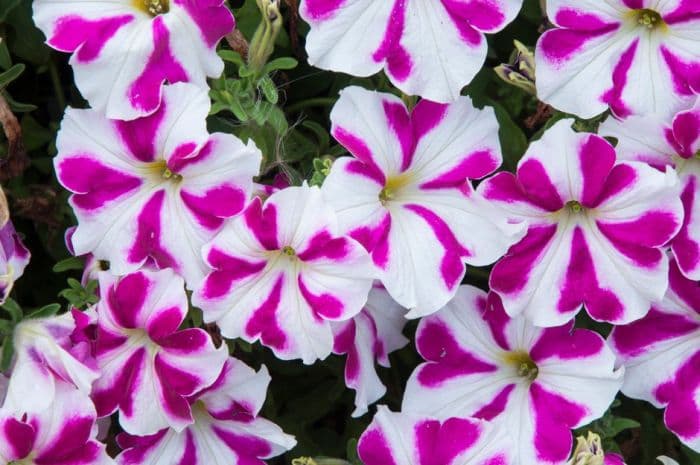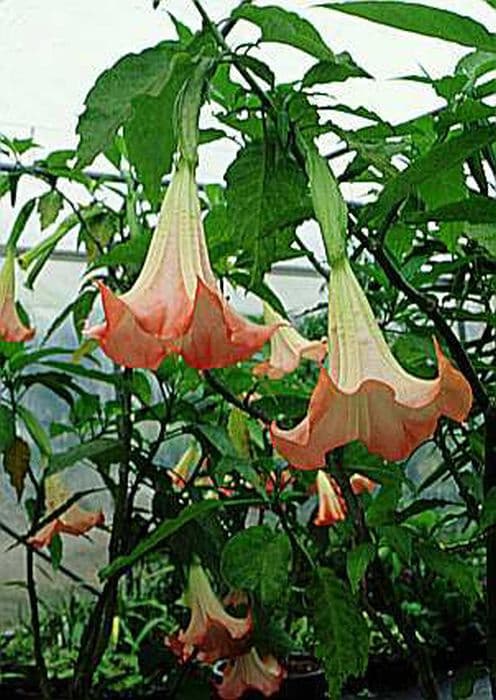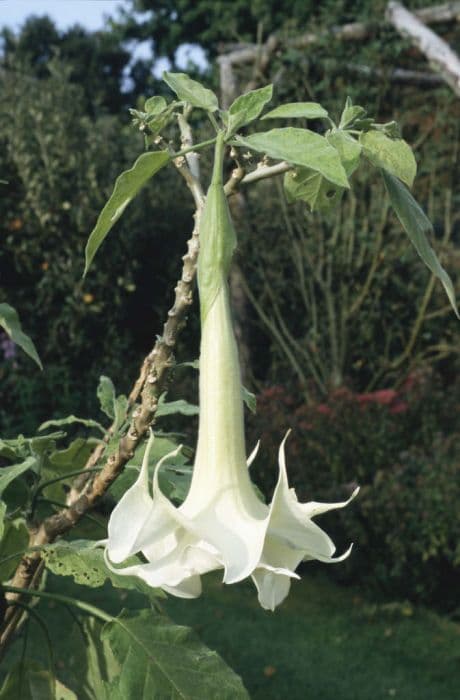Petunia Petunia 'Big Deal Flamenco Dancer'

ABOUT
The Petunia 'Big Deal Flamenco Dancer' is a vibrant and showy plant known for its striking floral display. The flowers of this cultivar exhibit an exuberant mix of colors, with each blossom featuring a stunning blend of pink and red hues. The petals are often artistically edged with a deep crimson, creating a frilly border that enhances the petunia's flamboyant aesthetic. The throat of the flower is usually a lighter shade, which may range from a pale pink to a creamy white, adding depth and contrast to the overall appearance. The blossoms of the 'Big Deal Flamenco Dancer' petunia have a lush, velvety texture and are prolific in their blooming, typically forming an abundant and eye-catching display. The petals are funnel-shaped, a characteristic feature of petunias, and flaunt a flared edge which gives them a lively, dynamic look reminiscent of a dancer's twirling skirt. The foliage of this petunia consists of green leaves that provide a lush background for the vivid blossoms. The plant has a bushy and robust growth habit, making it an excellent choice for gardeners looking to add a splash of color to their flower beds or containers. The leaves are slightly hairy and have a somewhat sticky texture, which is common in many petunia varieties. Overall, the Petunia 'Big Deal Flamenco Dancer' catches the eye with its vivid coloring and prolific flowering nature. It is perfect for gardeners and landscapers seeking to infuse their spaces with a sense of drama and passion, much like the passionate movements of a flamenco dancer.
About this plant
 Names
NamesFamily
Solanaceae.
Synonyms
Petunia, Garden Petunia, Big Deal Flamenco Dancer Petunia.
Common names
Petunia 'Big Deal Flamenco Dancer'
 Toxicity
ToxicityTo humans
Petunias, including the 'Big Deal Flamenco Dancer' variety, are generally considered non-toxic to humans. They are not known to contain any substances that pose a risk of poisoning if ingested. While they are not poisonous, it is still advisable not to eat them as they are not intended for human consumption and could cause mild stomach discomfort if ingested in large quantities.
To pets
Petunias, such as the 'Big Deal Flamenco Dancer', are generally recognized as safe for pets. They are not toxic to cats, dogs, or other household animals. Ingestion of petunias typically does not lead to any serious poisoning symptoms. However, as with any non-food plants, overconsumption could potentially result in some mild gastrointestinal upset such as vomiting or diarrhea in sensitive pets.
 Characteristics
CharacteristicsLife cycle
Annuals
Foliage type
Deciduous
Color of leaves
Green
Flower color
Mixed
Height
1 foot (30 cm)
Spread
1 foot (30 cm)
Plant type
Herb
Hardiness zones
9
Native area
South America
Benefits
 General Benefits
General Benefits- Aesthetic Appeal: Petunias are known for their vibrant and diverse colors, creating a visually striking addition to gardens and landscapes.
- Easy to Grow: They are relatively low-maintenance, making them suitable for gardeners of all levels of experience.
- Continuous Blooming: Petunias can bloom from spring until frost, providing long-lasting color throughout the growing season.
- Attracts Pollinators: The flowers can attract butterflies and hummingbirds, which are beneficial for pollination.
- Versatility: Petunias can be used in various garden settings, including beds, borders, and containers.
- Drought Tolerance: They are somewhat drought-tolerant once established, requiring less frequent watering compared to some other plants.
- Variety of Uses: Ideal for hanging baskets, window boxes, and patio pots due to their cascading growth habit.
 Medical Properties
Medical PropertiesThis plant is not used for medical purposes.
 Air-purifying Qualities
Air-purifying QualitiesThis plant is not specifically known for air purifying qualities.
 Other Uses
Other Uses- Colorant: Petals of the petunia can be crushed to create a natural pink or purple dye for fabrics or artisanal crafts.
- Photography: Petunias add aesthetic appeal when used as a subject or backdrop in macro photography and artistic compositions.
- Culinary Presentation: Edible petunia flowers can garnish desserts and salads, adding vibrant color and a touch of elegance.
- Educational Tool: Petunias can be used in science classes to demonstrate principles of plant biology, hybridization, and genetics.
- Art Supplies: The flowers can be pressed and used in the creation of botanical art, such as handmade paper or bookmarks.
- Natural Confetti: Dried petunia petals can serve as biodegradable confetti for eco-friendly celebrations.
- Perfumery: While not a common use, the fragrance of petunias can be captured and used in making homemade perfumes or scented sachets.
- Thematic Landscaping: Petunias can be used in themed garden designs, such as a flamenco or Spanish inspired garden, due to their vibrant, ruffled appearance.
- Seasonal Festivities: Petunias can be a part of holiday decor, especially for spring and summer events, as they embody the lively spirit of these seasons.
- Companion Planting: While not unusual, petunias can be planted among vegetables to add color and possibly deter certain pests with their scent.
Interesting Facts
 Feng Shui
Feng ShuiThe petunia is not used in Feng Shui practice.
 Zodiac Sign Compitability
Zodiac Sign CompitabilityThe petunia is not used in astrology practice.
 Plant Symbolism
Plant Symbolism- Anger or Resentment: Petunias can symbolize anger or resentment, especially in historical contexts where they might have been used to express feelings of irritation towards someone.
- Desire: They can also suggest desire or passion, perhaps due to their vivid colors and the alluring patterns found in varieties such as 'Big Deal Flamenco Dancer'.
- Comfort: Because of their ease of care and the pleasure they provide to home gardeners, petunias often symbolize a sense of comfort or the presence of a soothing environment.
- Grace: The elegant form of the petunia's flowers can represent grace and gentility, which might allude to the pleasant, balletic appearance of the 'Flamenco Dancer' variant.
 Water
WaterPetunias need regular watering to thrive, particularly during the warmer months. For the Petunia 'Big Deal Flamenco Dancer', it is ideal to water the plant once every two to three days, allowing the soil to dry slightly between waterings. Use a watering can or hose to gently water the plant at its base, avoiding wetting the foliage to prevent disease. Provide approximately one to two gallons of water per week, adjusting for rainfall and temperature conditions. During hot, dry periods, you may need to water more frequently to ensure the plant remains hydrated.
 Light
LightPetunias require abundant light to produce vibrant blooms. The Petunia 'Big Deal Flamenco Dancer' performs best in a location that receives full sunlight for at least six to eight hours a day. Avoid placing your petunias in deep shade or excessively bright, scorching locations where the flowers might wither. Morning sunlight with some protection from intense afternoon sun in hot climates is optimal for maintaining healthy growth and plentiful blossoming.
 Temperature
TemperaturePetunias, including the Petunia 'Big Deal Flamenco Dancer', prefer moderate temperatures and will perform best when daytime temperatures range between 60 to 85 degrees Fahrenheit. They can tolerate minimum temperatures down to about 40 degrees Fahrenheit but should not be exposed to frost. Ideal growth and blooming occur when night temperatures are between 55 to 65 degrees Fahrenheit, so avoid placing them in areas where nighttime temperatures dip excessively.
 Pruning
PruningRegular pruning of the Petunia 'Big Deal Flamenco Dancer' is essential for encouraging bushier growth and more abundant flowers. Pinch back the tips of the stems after the initial flush of flowers has faded to promote new growth. Perform this light pruning every few weeks during the growing season, particularly after a large number of blossoms have withered. The best time for more extensive pruning is in midsummer, when the plant may start to look leggy and less vibrant.
 Cleaning
CleaningAs needed
 Soil
SoilPetunias thrive in light, well-draining soil with a slightly acidic to neutral pH between 6.0 and 7.0. A good soil mix for petunias includes peat moss, perlite, and compost in equal parts, to ensure proper drainage and fertility.
 Repotting
RepottingPetunias typically don't require frequent repotting and can thrive in the same container for a season. Repot annually if the plant outgrows its container or if the soil needs refreshing.
 Humidity & Misting
Humidity & MistingPetunias prefer moderate humidity levels and do well in typical outdoor conditions; they do not have special humidity requirements.
 Suitable locations
Suitable locationsIndoor
Place in bright, indirect light and keep soil moderately moist.
Outdoor
Choose a sunny spot and protect from strong winds.
Hardiness zone
9-11 USDA
 Life cycle
Life cycleThe life of Petunia 'Big Deal Flamenco Dancer', commonly known as petunia, begins with seed germination, which requires warm soil and full sunlight to initiate. Emerging as seedlings with two small leaves, the plants rapidly develop true leaves and a root system. During the vegetative stage, petunias grow and form a bushy structure, and as they mature, they begin to produce buds, a stage that can be enhanced with regular fertilization. The flowering stage follows, where vibrant, funnel-shaped flowers bloom, attracting pollinators and adding aesthetic value to gardens and landscapes. After pollination, the plant produces seeds within capsules, and once mature, these seeds are dispersed, completing the reproductive cycle. Petunias are annuals, so each plant typically completes its life cycle within one growing season, after which it dies, relying on seed dispersal for propagation.
 Propogation
PropogationPropogation time
Spring-Summer
The Petunia 'Big Deal Flamenco Dancer', commonly known as a type of petunia, can typically be propagated by seed or cuttings, with seeding being the most popular method for this particular variety. To propagate petunias by seed, start the seeds indoors about 10 to 12 weeks before the last expected frost date to give them a head start. Sow the seeds thinly onto the surface of a moist, well-drained seed starting mix, as petunia seeds need light to germinate, making sure not to cover the seeds with soil. Place the seed tray in a warm area, ideally between 70 to 75 degrees Fahrenheit (21 to 24 degrees Celsius), and keep the soil moist but not waterlogged. Transplant the seedlings to individual pots once they have a couple of true leaves and are large enough to handle, gradually acclimatizing them to outdoor conditions before planting them out after all danger of frost has passed.


![Calibrachoa [Aloha Classic Blue Sky]](/_next/image?url=https%3A%2F%2Fplants-admin.emdemapps.com%2Fimages%2Fplants%2F%2Fimages%2F604b636c3778b.png&w=640&q=75)
![Calibrachoa [Aloha Classic Gold]](/_next/image?url=https%3A%2F%2Fplants-admin.emdemapps.com%2Fimages%2Fplants%2F%2Fimages%2F604b6284c573e.png&w=640&q=75)
![Calibrachoa [Aloha Classic Tiki Soft Pink]](/_next/image?url=https%3A%2F%2Fplants-admin.emdemapps.com%2Fimages%2Fplants%2F%2Fimages%2F604b548e0a5ef.png&w=640&q=75)
![Calibrachoa [Cabaret Deep Yellow]](/_next/image?url=https%3A%2F%2Fplants-admin.emdemapps.com%2Fimages%2Fplants%2F%2Fimages%2F604b5f20ca3ef.png&w=640&q=75)
![Calibrachoa [Calibasket Radiant Orange]](/_next/image?url=https%3A%2F%2Fplants-admin.emdemapps.com%2Fimages%2Fplants%2F%2Fimages%2F604b536d43cb2.png&w=640&q=75)
![Calibrachoa [Caloha Classic Blue Velvet]](/_next/image?url=https%3A%2F%2Fplants-admin.emdemapps.com%2Fimages%2Fplants%2F%2Fimages%2F604b604884a75.png&w=640&q=75)
![Calibrachoa [Caloha Classic Honey White]](/_next/image?url=https%3A%2F%2Fplants-admin.emdemapps.com%2Fimages%2Fplants%2F%2Fimages%2F604b5f56e0beb.png&w=640&q=75)
![Calibrachoa [Caloha Classic Yellow Chocolate Ring]](/_next/image?url=https%3A%2F%2Fplants-admin.emdemapps.com%2Fimages%2Fplants%2F%2Fimages%2F604b538aede95.png&w=640&q=75)